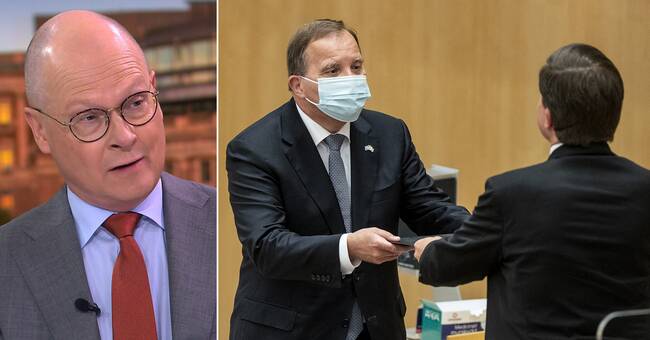For Stefan Löfven, it is a great success to return as Prime Minister after the recent political turbulence.
With the Liberals' definitive departure from January co-operation, his power base in the Riksdag has eroded sharply.
But despite the extremely even situation in the Riksdag, Stefan Löfven still managed to be elected again.
Through a somewhat unclear agreement on the forest and beach protection, he got the Center Party to print yellow.
And through unique separate negotiations with an individual Member of Parliament, Amineh Kakabaveh, he succeeded in securing the decisive mandate.
That a liberal member of parliament chose to break the party line thus did not matter.
"Balance sheet on slack line"
Stefan Löfven has been ill several times during his more than seven years as Prime Minister, but previous crises have faded compared to the development of events in recent weeks.
And even if Löfven can now return as prime minister, a balancing act awaits a slack line if he is to be able to remain in office for the rest of his term.
It is both about a fragile government base but also about contradictions between the parties in this base.
All this makes his new government a high-risk project.
The Left Party and the Center Party are on a collision course on economic policy.
The Left Party demands political influence to support the government's economic policy, the Center Party promises to vote no if Löfven gives the Left Party this influence.
The Left Party's decision to never again constitute passive support in the Riksdag for an S-led government also means completely new conditions for Löfven's government.
Another factor is the contradictions between the Center Party and the Green Party.
These include changed beach protection and strengthened ownership of forests, which are important demands for the Center Party to support the government's budget, but where the Green Party flatly says no.
These question marks create significant uncertainty about Löfven's new government.
He himself has already threatened to resign if he does not succeed in taking the autumn budget through the Riksdag.
In that case, there could be a new government crisis later this autumn.
Parts of the party are demanding a left turn
The unclear situation also means that important proposals for the Social Democrats can be difficult to push through.
One of them is the party's election promise of a family week where it is unclear today whether the government can gather a majority.
Stefan Löfven will lead the weakest government in Sweden for decades.
With the January agreement now gone, some Social Democrats hope that the party can make the left turn that has been demanded in parts of the party.
But in that case it will probably be mostly in the rhetoric.
There is no majority in the Riksdag for such a policy.
Should Löfven come forward with such proposals in the autumn budget, there is therefore a great risk that it will fall.
Nevertheless, not least the Left Party seems to be pushing for more of left-wing politics, and Nooshi Dadgostar has, as is well known, been clear that she demands influence to support a budget.
The main problem for Stefan Löfven in the new situation he is now in is that the more he tries to adapt to the Left Party's demands, the greater the risk he runs of losing the Center Party's support at the same time.
And he needs the mandate of both parties to get his policy through the Riksdag.
A difficult challenge thus awaits, even for one who can be described as a political survival artist.

